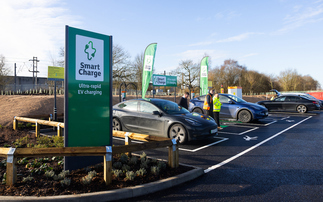Auto giant unveils "sun-powered" car with integrated rooftop solar panel
Ford has confirmed it will use the Consumer Electronics Show (CES) in Las Vegas to unveil an innovative new concept car that promises to use its own rooftop solar panel to power the vehicle.
A number of manufacturers have sought to integrate solar cells into car chassis in the past to run the vehicles' electronics, but Ford claims to have delivered a "first-of-its-kind" hybrid that uses solar power to drive the motor.
Dubbed the C-MAX Solar Energi Concept, Ford said the solar PV panel on the roof used a specially designed concentrating lens to ensure that a day's worth of sunlight can deliver the same performance as the conventional C-MAX Energi plug-in hybrid, which draws its power from the electric grid.
Plug-in hybrids use a battery to power the vehicle for short journeys, before automatically switching to a petrol or diesel engine for longer journeys. However, Ford maintains that by powering the battery using solar power the vehicle can cut both carbon emissions and running costs further still.
"Ford C-MAX Energi gets a combined best miles per gallon equivalent in its class, with EPA-estimated 108 MPGe city and 92 MPGe highway, for a combined 100 MPGe," the company said in a statement. "By using renewable power, Ford C-MAX Solar Energi Concept is estimated to reduce the annual greenhouse gas emissions a typical owner would produce by four metric tons."
Mike Tinskey, Ford global director of vehicle electrification and infrastructure, said the concept car "shines a new light on electric transportation and renewable energy".
"As an innovation leader, we want to further the public dialog about the art of the possible in moving the world toward a cleaner future," he added.
Ford revealed that the solar cells used in the car had been provided by SunPower, while work with the Georgia Institute of Technology had led the development of a special Fresnel lens that increased the impact of the sunlight by a factor of eight. "Similar in concept to a magnifying glass, the patent-pending system tracks the sun as it moves from east to west, drawing enough power from the sun through the concentrator each day to equal a four-hour battery charge," the company said.
As such, solar charging can enable the car to travel up to 21 electric only miles each day, supporting a total range of 620 miles.
Moreover, the concept car still boasts a charge port, meaning it can be recharged from the grid if required. However, the company said that internal modelling suggested the sun could power up to 75 per cent of all trips made by an average driver in a solar hybrid vehicle.
Ford also stressed that the new design was part of a major push from the manufacturer to provide cleaner and more efficiency vehicles. It said that it expects to sell 85,000 hybrids, plug-in hybrids and all-electric vehicles in 2013 - the first full year that its six new electrified vehicles have been available in dealer showrooms.








